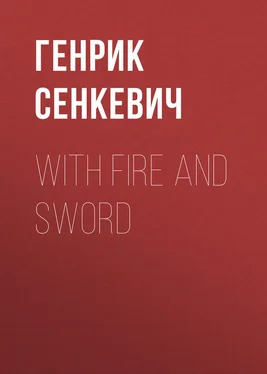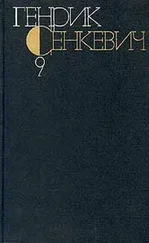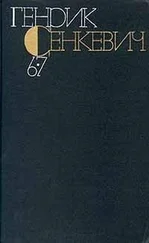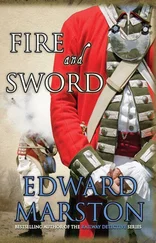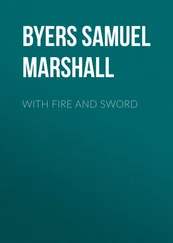Генрик Сенкевич - With Fire and Sword
Здесь есть возможность читать онлайн «Генрик Сенкевич - With Fire and Sword» — ознакомительный отрывок электронной книги совершенно бесплатно, а после прочтения отрывка купить полную версию. В некоторых случаях можно слушать аудио, скачать через торрент в формате fb2 и присутствует краткое содержание. Жанр: foreign_antique, foreign_prose, на английском языке. Описание произведения, (предисловие) а так же отзывы посетителей доступны на портале библиотеки ЛибКат.
- Название:With Fire and Sword
- Автор:
- Жанр:
- Год:неизвестен
- ISBN:нет данных
- Рейтинг книги:4 / 5. Голосов: 1
-
Избранное:Добавить в избранное
- Отзывы:
-
Ваша оценка:
- 80
- 1
- 2
- 3
- 4
- 5
With Fire and Sword: краткое содержание, описание и аннотация
Предлагаем к чтению аннотацию, описание, краткое содержание или предисловие (зависит от того, что написал сам автор книги «With Fire and Sword»). Если вы не нашли необходимую информацию о книге — напишите в комментариях, мы постараемся отыскать её.
With Fire and Sword — читать онлайн ознакомительный отрывок
Ниже представлен текст книги, разбитый по страницам. Система сохранения места последней прочитанной страницы, позволяет с удобством читать онлайн бесплатно книгу «With Fire and Sword», без необходимости каждый раз заново искать на чём Вы остановились. Поставьте закладку, и сможете в любой момент перейти на страницу, на которой закончили чтение.
Интервал:
Закладка:
"The hussars are charging!" cried Pan Yan.
They had, in fact, bent forward in the saddles, and were moving on, and immediately after them the dragoon regiments and the whole line of battle.
The momentum of the hussars was terrible. At the first onset they struck three kurens, – two of Stebloff, and one of Mirgorod, – and crushed them in the twinkle of an eye. The roar reached the ears of Skshetuski. Horses and men, thrown from their feet with the gigantic weight of the iron riders, fell like grain at the breath of a storm. The resistance was so brief that it seemed to Pan Yan as though some enormous dragons had swallowed the three kurens at a gulp. And they were the best troops of the Saitch. Terrified by the noise of the wings, the horses began to spread disorder in the Zaporojian ranks. The Irkleyeff, Kalnibolok, Minsk, Shkurinsk, and Titareff regiments fell into complete disorder, and pressed by the mass of the fleeing, began to retreat in confusion. Meanwhile the dragoons came up with the hussars, and began to help them in the bloody harvest. The Vasyurinsk kuren, after a desperate resistance, turned in flight to the Cossack intrenchments. The centre of Hmelnitski's forces, shaken more and more, beaten, pushed into a disorderly mass, slashed with swords, forced back in the iron onset, was unable to get time to stop and re-form.
"Devils! not Poles!" cried old Zakhar.
Skshetuski was as if bewildered. Being ill, he could not master himself. He laughed and cried at once, and at times screamed out words of command, as if he were leading the regiments himself. Zakhar held him by the skirts, and had to call others to his aid.
The battle came so near the Cossack camp that faces could be almost distinguished. There were artillery discharges from the intrenchments; but the Cossack balls, striking their own men as well as the enemy, increased the disorder. The hussars struck upon the Pashkoff kuren, which formed the guard of the hetman, in the centre of which was Hmelnitski himself. Suddenly a fearful cry was heard through all the Cossack ranks. The great red standard had tottered and fallen.
But at that moment Krechovski, at the head of his five thousand Cossacks, rushed to the fight. Sitting on an enormous cream-colored horse, he flew on in the first rank, without a cap, a sabre above his head, gathering before him the disordered Zaporojians, who, seeing the approaching succor, though without order, returned to the attack. The battle raged again in the centre of the line.
On both flanks fortune in like manner failed Hmelnitski. The Tartars, repulsed twice by the Wallachian regiments and Pototski's Cossacks, lost all eagerness for the fight. Two horses were killed under Tugai Bey. Victory inclined continually to the side of young Pototski.
But the battle did not last long. The rain, which for some time had been increasing every moment, soon became so violent that through the rush of water nothing could be seen. Not streams, but torrents of rain fell on the ground from the open flood-gates of heaven. The steppe was turned into a lake. It grew so dark that one man could not distinguish another at a few paces' distance. The noise of the storm drowned the words of command. The wet muskets and guns grew silent. Heaven itself put an end to the slaughter.
Hmelnitski, drenched to the skin, furious, rushed into his camp. He spoke not a word to any man. A tent of camelskin was pitched, under which, hiding himself, he sat alone with his sad thoughts.
Despair seized him. He understood at last what work he had begun. See! he is beaten, repulsed, almost broken, in a battle with such a small force that it could be properly considered as a scouting party. He knew how great was the power of resistance in the armies of the Commonwealth, and he took that into account when he ventured on a war. And still he had failed in his reckoning, – so at least it seemed to him at that moment. Therefore he seized himself by his shaven head, and wished to break it against the first cannon he saw. What would the resistance be at his meeting with the hetmans and the whole Commonwealth?
His thoughts were interrupted by the entrance of Tugai Bey. The eyes of the Tartar were blazing with rage; his face was pale, and his teeth glittered from behind his lips, unhidden by mustaches.
"Where is the booty, where the prisoners, where the heads of the leaders, – where is victory?" asked he, in a hoarse voice.
Hmelnitski sprang from his place. "There!" answered he loudly, pointing to the Polish camp.
"Go there, then!" roared Tugai Bey; "and if you don't go, I will drag you by a rope to the Crimea."
"I will go," said Hmelnitski, – "I will go to-day! I will take booty and prisoners; but you shall give answer to the Khan, for you want booty and you avoid battle."
"Dog!" howled Tugai Bey, "you are destroying the army of the Khan!"
For a moment they stood snorting in front of each other. Hmelnitski regained his composure first.
"Tugai Bey," said he, "be not disturbed! Rain interrupted the battle, just as Krechovski was breaking the dragoons. I know them! They will fight with less fury to-morrow. The steppe will be mud to the bottom. The hussars will be beaten. To-morrow everything will be ours."
"That's your word!" blurted out Tugai Bey.
"And I will keep it. Tugai Bey, my friend, the Khan sent you for my assistance, not for my misfortune."
"You prophesied victory, not defeat."
"A few prisoners of the dragoons are taken; I will give them to you."
"Let me have them. I will order them to be empaled."
"Don't do that. Give them their liberty. They are men from the Ukraine, from Balaban's regiment. I will send them to bring the dragoons over to our side. It will be with them as with Krechovski."
Tugai Bey was satisfied; he glanced quickly at Hmelnitski, and muttered: "Serpent!"
"Craft is the equal of courage. If we persuade the dragoons to our side, not a man of the Poles will escape, – you understand!"
"I will have Pototski."
"I will give him to you, and Charnetski also."
"Let me have some vudka now, for it is cold."
"Agreed."
At that moment entered Krechovski. The colonel was as gloomy as night. His future starostaships, dignities, castles, and wealth were covered as if with a fog. To-morrow they may disappear altogether, and perhaps out of that fog will rise in their place a rope or a gibbet. Were it not that the colonel had burned the bridges in his rear by destroying the Germans, he would surely have begun to think how to betray Hmelnitski in his turn, and go over with his Cossacks to Pototski's camp. But that was impossible now.
The three sat down, therefore, to a decanter of vudka, and began to drink in silence. The noise of the rain ceased gradually. It was growing dark.
Skshetuski, exhausted from joy, weak and pale, lay motionless in the telega. Zakhar, who had become attached to him, ordered the Cossacks to put a little felt roof over him. The lieutenant listened to the dreary sound of the rain, but in his soul it was clear, bright, and joyful. Behold, his hussars had shown what they could do; his Commonwealth had shown a resistance worthy of its majesty; the first impetus of the Cossack storm had broken on the sharp spears of the royal army. And besides there are the hetmans, there is also Prince Yeremi, and so many lords, so many nobles, so much power, and above all these the king, primus inter pares . Pride expanded the breast of Skshetuski, as if at that moment it contained all that power.
In feeling this, he felt, for the first time since he had lost his freedom in the Saitch, a certain pity for the Cossacks; they were guilty, but blinded, since they tried to go to the sun on a spade. They were guilty, but unfortunate, since they allowed themselves to be carried away by one man, who is leading them to evident destruction.
Читать дальшеИнтервал:
Закладка:
Похожие книги на «With Fire and Sword»
Представляем Вашему вниманию похожие книги на «With Fire and Sword» списком для выбора. Мы отобрали схожую по названию и смыслу литературу в надежде предоставить читателям больше вариантов отыскать новые, интересные, ещё непрочитанные произведения.
Обсуждение, отзывы о книге «With Fire and Sword» и просто собственные мнения читателей. Оставьте ваши комментарии, напишите, что Вы думаете о произведении, его смысле или главных героях. Укажите что конкретно понравилось, а что нет, и почему Вы так считаете.
